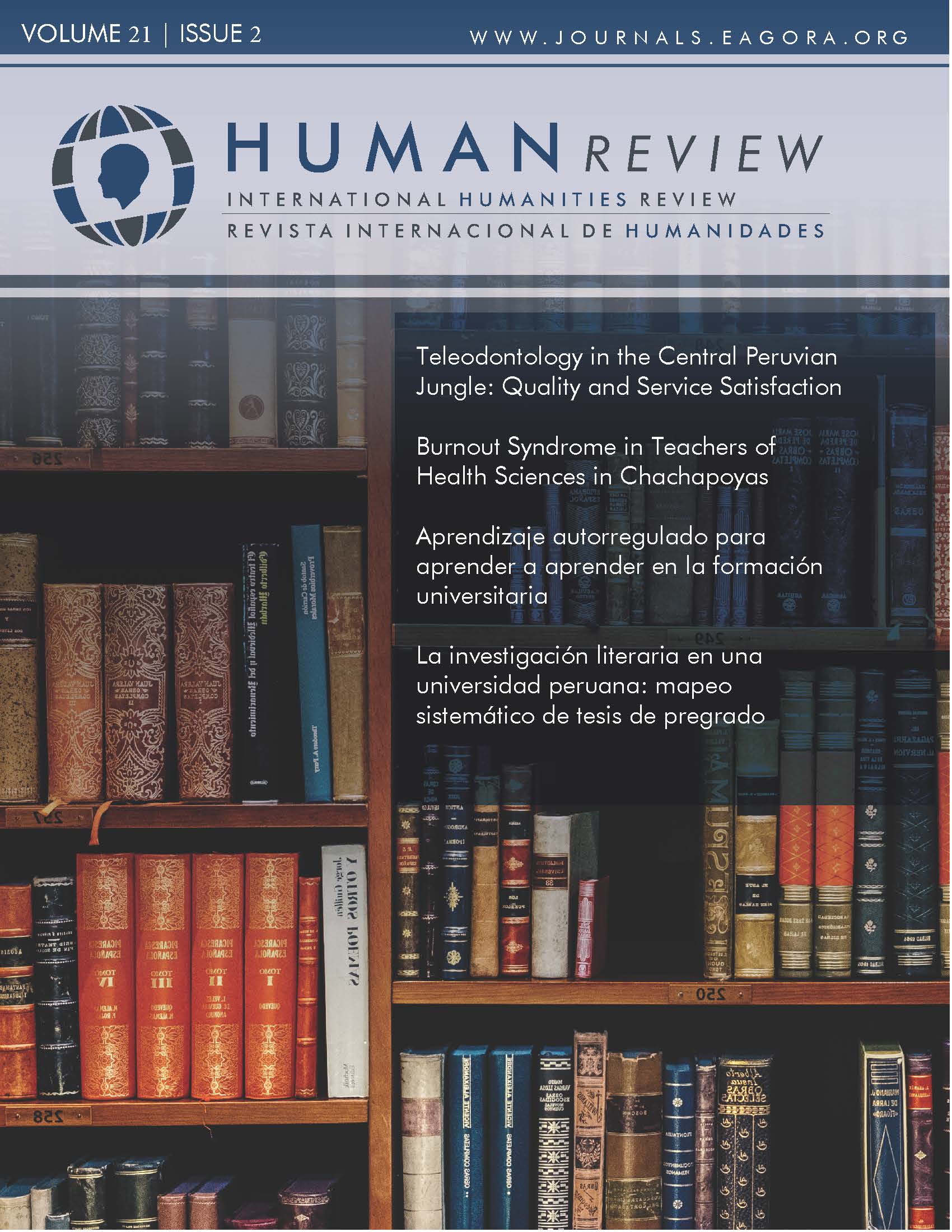Sociocultural Patterns: Child Rearing Styles in an Amuesha Community in the Central Jungle of Peru
DOI:
https://doi.org/10.37467/revhuman.v21.5084Keywords:
Sociocultural patterns, Child rearing, Native communityAbstract
The upbringing of infants in native communities is the concern of authorities and researchers for being a vulnerable population segment. The purpose of the study was to analyze child rearing styles of an Amuesha community in the Peruvian jungle. The phenomenological design allowed interviewing amuesha mothers from Oxapampa in Pasco, until reaching saturation. It was found as results that child rearing practices conform to sociocultural patterns, such as identity and communal heritage culture, which are in extinction due to the presence of exotic factors; in addition to a demand to the State for better education and health services.
References
Altmann, P., Rodríguez-Cruz, M. y Ordóñez, S. (2021). Inclusión/exclusión de los pueblos indígenas: movilización y participación como respuesta. Los pueblos indígenas de Abya Yala en el siglo XXI. Un análisis multidimensional. 65-97. https://idus.us.es/bitstream/handle/11441/132895/1/Inclusion_exclusion_de_los_pueblos_indig.pdf?sequence=1
Badanta Romero, B., Moreno-Moreno, B., Soto-Diaz, V. y Barrientos-Trigo. (2019). Nursing care to address community health of the indigenous population in the Peruvian Amazon. Journal Nursing Care, 31, 57-63. https://doi.org/10.1016/j.enfcli.2019.10.025
Banco Interamericano de Desarrollo. (2019). Brechas que perduran: una radiografía de la exclusión social en Perú. https://repositorio.grade.org.pe/bitstream/handle/20.500.12820/690/Alcazar_BID_ExclusionSocialPeru.pdf?sequence=1
Buitrago Restrepo, L. y Álvarez Herrera, L. (2022). Crianza kichwa en Medellín: tensiones entre lo ancestral y lo occidental. Revista Latinoamericana Ciencia Sociedad Niñez y Juventud, 20(2), 3-25. https://www.scopus.com/record/display.uri?eid=2-s2.0-85128609300&origin=resultslist&zone=contextBox
Campos Navarrete, M., & Zohar, A. (2021). Rethinking sustainable development by following Indigenous approaches to community wellbeing. Tapuya: Latin American Science, Technology and Society, 4(1), 1946315. https://www.tandfonline.com/doi/full/10.1080/25729861.2021.1946315
Colangelo, M. (2020). Crianza infantil y diversidad cultural. Aportes de la antropología a la práctica pediátrica. Archivos Argentinos de Pediatría, 118(4), 379-383. https://www.sap.org.ar/uploads/archivos/general/files_ae_colangelo_23-6pdf_1591730435.pdf
Cruz-Aguilar, R., Meregildo-Gómez, M., Esquivel-Grados, J., Venegas-Mejía, V., Esquivel-Grados, M. (2021). Investigación educativa en la práctica docente. Conocer la realidad desde el saber hacer. Editorial Grupo Compás. http://142.93.18.15:8080/jspui/bitstream/123456789/717/1/listo.pdf
Cudris Torres, L., Bermúdez-Cuello, J., Rojas-Angarita, A., Romero-Munive, M. y Olivella-López, G. (2020). Familia, cultura y sociedad: factores determinantes del desarrollo humano. Desbordes, 11(1), 48 – 59. https://hemeroteca.unad.edu.co/index.php/desbordes/article/view/4107
Incacutipa, D. (2021). El juego del niño indígena aymara y los saberes previos como fundamento para la educación intercultural. RIDE - Revista Iberoamericana para la Investigación y el Desarrollo Educativo, 11(22), 1-16. https://doi.org/10.23913/ride.v11i22.887
Instituto Nacional de Estadística e Informática -INEI. (2019). Perú: Indicadores de Educación por departamentos, 2008-2018. https://www.inei.gob.pe/media/MenuRecursivo/publicaciones_digitales/Est/Lib1680/
Landoy, B., Peña Alampay, L., Lachman, J. M., Madrid, B. J., Hutchings, J., Ward, C. L., & Gardner, F. (2021). A South‐to‐South Cultural Adaptation of an Evidence‐Based Parenting Program for Families in the Philippines. Family Process, 60(4), 1202-1216. https://onlinelibrary.wiley.com/doi/full/10.1111/famp.12625
Leavy, P. y Szulc, A. (2021). Cuidando a los niños y niñas, cuidando el territorio. Una mirada etnográfica sobre comunidades rurales mapuche y ava-guaraní en Argentina. Revista Indiana, 38(1), 79-101. https://ri.conicet.gov.ar/bitstream/handle/11336/157253/CONICET_Digital_Nro.a10047a9-a0ed-4714-b294-a578d1be6ae2_A.pdf?sequence=2
Mendoza, A. de (2022, 15 de octubre). La delgada línea de la vulnerabilidad. UNICEF Perú. https://www.unicef.org/peru/articulos/delgada-linea-vulnerabilidad-proteccion-social-peru
Ministerio de Cultura. (2023). Base de datos de Pueblos Indígenas u Originarios. https://bdpi.cultura.gob.pe/lenguas/yanesha
Ministerio de Educación. (2018). Lenguas Originarias del Perú. El autor. Educación. https://centroderecursos.cultura.pe/es/registrobibliografico/lenguas-originarias-del-perú.
Moreno Zavaleta, M. T. (2022). Políticas públicas orientadas a la prevención y protección de la primera infancia en el Perú. Educación, 28(1), e2527. https://doi.org/10.33539/educacion.2022.v28n1.2527
Murovhi, A., Matshidze, P., Netshandama, V. y Klu, E. (2018). Traditional child rearing practices in vhavenda families South Africa. Journal of gender, information, and development in Africa, 7(1), 21-37. https://hdl.handle.net/10520/EJC-ee9c60c03
Nieva, L., Moscoso, K., Nieva, A. y Rosales, S. (2021). Encuentro Tinkuy: el caso peruano, ¿política multicultural o intercultural? Conrado, 17(82), 61-67. http://scielo.sld.cu/scielo.php?script=sci_arttext&pid=S1990-86442021000500061
Peña Ramos, M., Vera-Noriega, J. y Santiz-López, J. (2017). Niñez y crianza en una zona rural tseltal en Altos de Chiapas. Revista Latinoamericana de Ciencias Sociales, Niñez y Juventud, 16(1), 149-162. http://www.scielo.org.co/pdf/rlcs/v16n1/1692-715X-rlcs-16-01-00149.pdf
Plesko, C., Zhiyuan, Y., Tobin, K. y Gross, D. (2021). Social connectedness among parents raising children in low‐income communities: An integrative review. Research in Nursing Health. 1(44), 957–969. https://doi.org/10.1002/nur.22189
Pesantes, M. y Gianella, C. (2020). ¿Y la salud intercultural? Lecciones desde la pandemia que no debemos olvidar. Mundo Amazónico, 11(2), 93-110. http://dx.doi.org/10.15446/ma.v11n2.88659
Punin, M., Carrillo, J. y Reyes, J. (2018). Estilos de crianza en familias indígenas Cañaris. In Memorias del cuarto Congreso Internacional de Ciencias Pedagógicas de Ecuador: La formación y superación del docente:" desafíos para el cambio de la educación en el siglo XXI" ,581-591. https://www.pedagogia.edu.ec/public/docs/3b7a16f9500e2f278c72b600d9116858.pdf
Rodríguez, M., Santos, Q., Talani, O. y Tovar, R (2015). Prácticas y creencias culturales acerca del cuidado de niños menores de un año en un grupo de madres de Chocontá, Colombia. Revista Colombiana de Enfermería, 9, 77-88. https://revistacolombianadeenfermeria.unbosque.edu.co/index.php/RCE/article/view/567
Sánchez, D. (2017). ¿Sabemos cuánta población indígena hay en el Perú? https://www.revistaideele.com/2022/05/25/sabemos-cuanta-poblacion-indigena-hay-en-el-peru/
Sánchez, M. (2021). El derecho de los pueblos indígenas a una Educación Intercultural Bilingüe (EIB) en tiempos de Covid-19. SPDA. https://repositorio.spda.org.pe/bitstream/20.500.12823/594/1/El-derecho-de-los-pueblos-indigenas-a-una-educacion-2.pdf
Sherman, J. y Schafft, K. (2022). Turning Their Back on Kids”: Inclusions, Exclusions, and the Contradictions of Schooling in Gentrifying Rural Communities. The Russell Sage Foundation Journal of the Social Sciences, 8(3), 150–170. https://www.rsfjournal.org/content/rsfjss/8/3/150.full.pdf
Vargas, P. y Marulanda, J. (2021). Pautas de crianza en el desarrollo socioemocional de los niños y las niñas de educación inicial desde una perspectiva intercultural en el municipio de Supía-Caldas. https://repositorio.uniclaretiana.edu.co/jspui/bitstream/20.500.12912/980/1/fucla_interul|turalidad_ni%C3%B1os_adolescentes.pdf
Downloads
Published
How to Cite
Issue
Section
License
Those authors who publish in this journal accept the following terms:
- Authors will keep the moral right of the work and they will transfer the commercial rights.
- After 1 year from publication, the work shall thereafter be open access online on our website, but will retain copyright.
- In the event that the authors wish to assign an Creative Commons (CC) license, they may request it by writing to publishing@eagora.org









